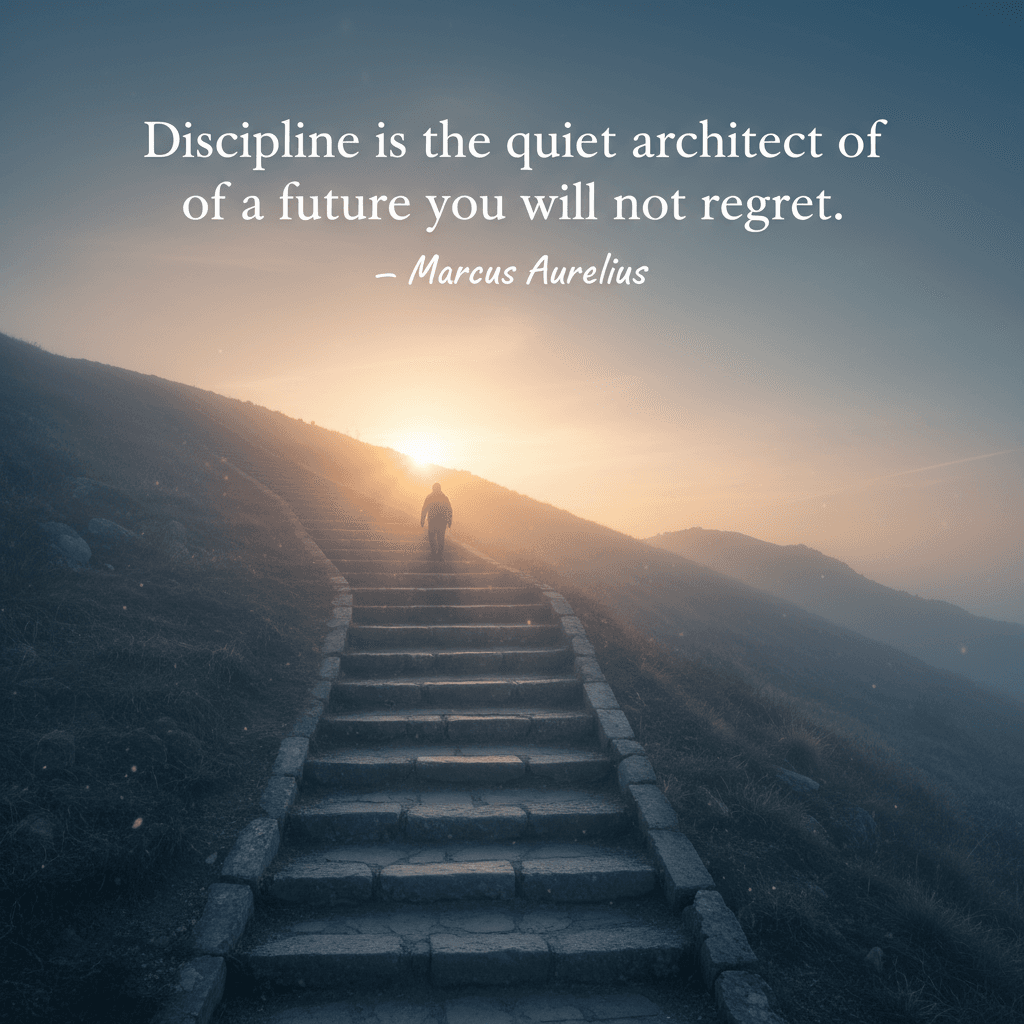Quiet Discipline Designs a Future Without Regret

Discipline is the quiet architect of a future you will not regret. — Marcus Aurelius
—What lingers after this line?
One-minute reflection
What does this quote ask you to notice today?
The Quiet Architect Metaphor
To begin, calling discipline a quiet architect reframes it from harsh self-denial to patient design. Architects do not shout buildings into existence; they draft blueprints, calculate loads, and return each day to incremental work. Likewise, disciplined choices are small, nearly invisible—what you read before bed, where you place your phone, how you open a meeting—but they determine what your future can bear. Because they operate below the noise of applause, these choices rarely feel heroic. Yet, as with a structure’s foundation, their effects compound, settling and strengthening until, one day, the form of a life stands where a scaffold once was.
Stoic Foundations for Daily Practice
To ground this idea, Stoic practice offers a sturdy precedent. Marcus Aurelius’s Meditations (Book 5.1) shows him rehearsing the morning struggle—get up, do your duty, remember your nature—so that discipline becomes routine rather than drama. Similarly, Epictetus’s Enchiridion (1) distinguishes what is up to us from what is not, directing effort toward controllable actions. In both cases, the emphasis is not on spectacle but on steady alignment: thought, word, and deed moving in one direction. The Stoics thus treat discipline as daily carpentry—shaping character grain by grain—so that when fate tests the structure, it does not sway.
Habit Architecture and Compounding
Extending the metaphor, habits are the beams and joints of disciplined living. Charles Duhigg’s The Power of Habit (2012) maps the cue–routine–reward loop, showing how small redesigns in context cascade into lasting change. James Clear’s Atomic Habits (2018) adds an identity frame: people keep what confirms who they believe they are. Therefore, discipline scales when we build environments and identities that make the right action the easy action—setting cues, shrinking friction, and celebrating tiny wins. Over time, such “compounding” resembles accrued interest: minute deposits of effort grow into substantial capital, which future you can finally spend.
Why Discipline Works Quietly, Not Loudly
Moreover, effective discipline favors silence over spectacle because delayed rewards mature out of sight. The classic “marshmallow test” (Walter Mischel, 1970s) linked delay of gratification to later outcomes; later analyses (Watts, Duncan, and Quan, 2018) revealed socioeconomic factors that moderate this effect. Even so, the central lesson endures: stable contexts and practiced self-control make patience practical. Thus, rather than grand vows, disciplined people design conditions—sleep, social norms, proximity of temptations—that lower the noise floor. In the hush of good conditions, consistency becomes less an act of willpower and more an unobtrusive habit.
Regret Prevention and the Future Self
Looking ahead, discipline’s quiet virtue is that it shields you from foreseeable remorse. Hal Hershfield’s research on future-self continuity (2011) shows that when we feel emotionally connected to our older selves, we save more and make healthier choices. Daniel Gilbert’s Stumbling on Happiness (2006) reminds us that we mispredict what will satisfy us, often chasing intensity over meaning. Discipline, then, acts as a translator between present impulse and future well-being. It structures choices—study now, invest early, apologize promptly—so that when tomorrow arrives, it feels like a gift from a considerate friend, not a bill from a stranger.
Practical Scaffolding for Everyday Discipline
Accordingly, the craft begins with planful friction. Use implementation intentions—“If it’s 6 a.m., then I lace my shoes” (Peter Gollwitzer, 1999)—to attach action to cues. Practice premeditatio malorum from Seneca’s Letters to Lucilius: calmly visualize obstacles, then prebuild responses. Reduce choice overload by batching decisions, and protect energy with sleep and boundaries. Most importantly, review: like an architect’s site walk, a weekly audit exposes hairline cracks before they spread. In this way, discipline is not a mood but an infrastructure—quiet, reliable, and progressively self-reinforcing.
Humane Rigor, Not Harsh Asceticism
Finally, durable discipline is firm yet kind. Research on self-compassion (Kristin Neff, 2003) shows that treating setbacks with curiosity rather than contempt improves persistence. This matters because brittle perfectionism snaps under stress, whereas humane rigor bends and continues. When you miss a day, you restart the next; when a plan fails, you revise the blueprint instead of condemning the builder. Thus the future you do not regret is not spotless but well-constructed—its integrity arising from steady corrections, quietly made, until the life you inhabit matches the one you intended to build.